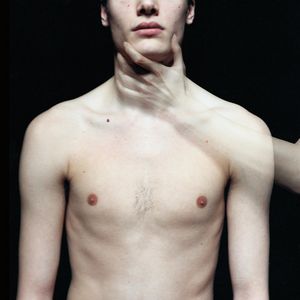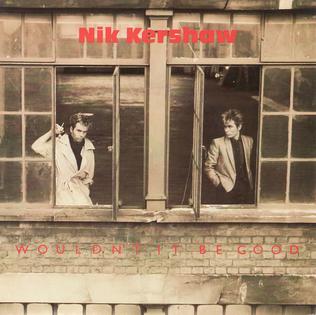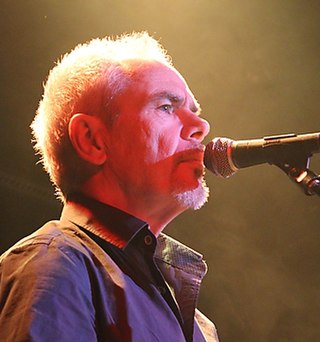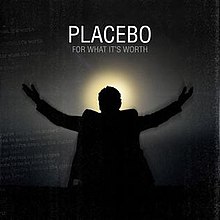
Placebo are a British alternative rock band, formed in London in 1994 by vocalist–guitarist Brian Molko and bassist–guitarist Stefan Olsdal. Drummer Robert Schultzberg joined in late 1994, but left in 1996 shortly after the release of the band's eponymous debut album due to conflicts with Molko, and was replaced the same year by Steve Hewitt. Molko was born in Belgium and Olsdal and Schultzberg in Sweden; remaining members Molko and Olsdal both grew up in Luxembourg before separately relocating to London and are both British citizens.

Nicholas David Kershaw is an English singer, songwriter, musician and record producer.

The Works is the fourth studio album by the English singer-songwriter and multi-instrumentalist Nik Kershaw. It was released in 1989 and was the last album he created for MCA Records. Kershaw chose the album's title as he felt the album represented "the collected works of Nik Kershaw". He did not release any new solo material until 15 Minutes, 10 years later.

Human Racing is the debut studio album by the English singer-songwriter Nik Kershaw, released on 27 February 1984 by MCA Records. Several songs like "Drum Talk" were based around improvisation; other songs, like "I Won't Let the Sun Go Down on Me", had a political message.

Radio Musicola is the third studio album by the English singer-songwriter Nik Kershaw, released on 24 October 1986 by MCA Records, just under two years after Kershaw's previous studio album, The Riddle (1984). It was the first studio album to be produced by Kershaw. It features guest backing vocalists, including Icehouse's Iva Davies, and Night's Stevie Lange, and Miriam Stockley.

The Riddle is the second studio album by English singer-songwriter Nik Kershaw, released on 19 November 1984 by MCA Records.

"The Bitter End" is a song by British alternative rock band Placebo. It was released as the lead single from their fourth studio album, Sleeping with Ghosts (2003), on 10 March 2003. The song is based on the novel Nineteen Eighty-Four by George Orwell. There are several references to it throughout the song, one of the most noticeable being the reference to 2 May - the date on which the two main characters, Winston and Julia, first spend the night together. "The Bitter End" and "Every You Every Me" are the two most often played songs in the Placebo's live shows.

"Wouldn't It Be Good" is a song by the English singer-songwriter Nik Kershaw, released on 20 January 1984 as the second single from his debut studio album, Human Racing (1984). The release was Kershaw's second single, with the non-album track "Monkey Business" as its B-side; it was a bonus track on the 2012 re-release of the album. The music video was directed by Storm Thorgerson.

"I Won't Let the Sun Go Down on Me" is a song by English singer-songwriter Nik Kershaw from his debut studio album, Human Racing (1984). It was his first single, released on 9 September 1983 to limited success. When re-released on 4 June 1984, the song became Kershaw's highest-charting single on the UK Singles Chart, peaking at number two. It features the non-album track "Dark Glasses" as the B-side, which was also released as a bonus track on the 2012 re-release of the album.

"Human Racing" is a song by the English singer-songwriter Nik Kershaw. It was the title track for his hit debut studio album of the same name, released in September 1984. It was the fourth hit single from the album, reaching No. 19 in the UK Singles Chart. It entered the chart in the week ending 15 September 1984, and remained within for seven weeks. An earlier version of the song, titled "Look Behind You", appeared on the studio album Till I Hear from You (1980) by Fusion, a band with Kershaw on lead vocals and guitar.

"The One and Only" is the debut single of British singer and actor Chesney Hawkes. Written by Nik Kershaw, the single was released by Chrysalis Records in February 1991. Produced by Kershaw and Alan Shacklock, and recorded and mixed by Gareth Cousins, the song was featured in the 1991 film Buddy's Song which starred Hawkes as the eponymous Buddy and Roger Daltrey as his father. The film performed moderately well at the UK box office, but the song was a hit in that country's music charts, spending five weeks at number one on the UK Singles Chart in March and April 1991. Kershaw's influence can also be heard throughout the track not only in guitar style, but in the backing vocals on the intro and choruses, with Hawkes singing the verses.

"When a Heart Beats" is a song by English singer-songwriter Nik Kershaw, released as the lead single from his third studio album, Radio Musicola (1986)—although the song does not appear on the LP version of the album, only on the cassette and CD editions. Kershaw's eighth single overall, it features the track "Wild Horses"—which was originally included on his previous studio album, The Riddle (1984)—as its B-side.

"The Riddle" is a song by the English singer-songwriter Nik Kershaw, released in 1984 as the lead single from his second studio album of the same name. Kershaw described the lyrical content as being nondescript to fill as a "guide vocal" for the production. It reached number three on the UK Singles Chart and peaked within the top 10 in countries like Ireland, Norway, Sweden, Australia and New Zealand. An accompanying music video was made for the song and features references to Lewis Carroll's book Alice's Adventures in Wonderland (1865).

"One Step Ahead" is a song by English singer-songwriter Nik Kershaw, released on 23 January 1989 as the lead single from his fourth studio album The Works (1989). It was written by Kershaw, and produced by Kershaw and Julian Mendelsohn. A music video was filmed to promote the single, and Kershaw also performed it on the Dutch TV show POP Formule.

The discography of Nik Kershaw consists of nine studio albums, three live albums, eight compilation albums, one extended play (EP) and 27 singles. His 62 weeks on the UK Singles Chart between 1984 and 1985 beat all other solo artists.

"Wide Boy" is a song by English singer-songwriter Nik Kershaw. It was his sixth consecutive top-20 single, peaking at No. 9 on the UK Singles Chart in 1985. It was followed by "Don Quixote" which was to become the last of his string of top-20 singles on the UK chart. "Wide Boy" also charted highly in Ireland and Australia, peaking at No. 5 and No. 7, respectively.

"Elisabeth's Eyes" is a song by English musician Nik Kershaw, released in 1989 as the second and final single from his fourth studio album, The Works (1989). It was written by Kershaw, and produced by Kershaw and Julian Mendelsohn.

"Don Quixote" is a song by English singer-songwriter Nik Kershaw from his 1984 studio album The Riddle. Released in August 1985 as the final single from that album, it reached No. 10 on the UK Singles Chart in September 1985, and became Kershaw's seventh consecutive UK top 20 hit single.

"Dancing Girls" is a song by the English singer-songwriter Nik Kershaw. It was the third single from his debut studio album, Human Racing, and released on 2 April 1984. It charted on 14 April 1984, and reaching a peak position of No. 13 in the UK Singles Chart. It stayed on the charts for nine weeks.

"Somebody Loves You" is a song from English singer-songwriter Nik Kershaw, which was released in 1999 as the lead single from his fifth studio album 15 Minutes. The song was written and produced by Kershaw. "Somebody Loves You" reached No. 70 in the UK Singles Chart.



















